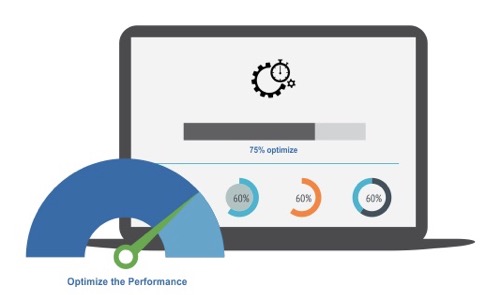How many times have you sat in front of your computer, wishing that it would load web pages faster? Or wondered exactly why it takes so long to boot up when you turn on the power? There could be several reasons why your home or work computer is running more slowly than you would like – including viruses, malware and inadequate processors – but sometimes, it’s simply a byproduct of how you work on your computer each day and how often you perform basic maintenance.
Just as your car needs regular oil changes, your computer needs regular attention to keep running at its optimum level. Every time you log on to a website, auto save a document or fail to shut down properly, you create clutter on your hard disk that will bog down your computer’s performance. And as you know, a slow computer is frustrating at best – and at worst, a poorly maintained system will prevent you from using the programs and files that you need to stay productive each day.
But how do you optimize your computer? How do you keep it running smoothly, and as fast as the day you brought it home (or had it delivered from your company’s IT department?) There are some steps you can take to optimize your PC, and most of them are fairly simple and can operate in the background while you work, or when you’re computer isn’t in use.
1. Install PC Optimizing Software
Perhaps the most efficient means to keep your computer in tip-top running condition is to install software that tunes up or optimizes your PC for you on a regular basis. These software will not only erase harmful viruses and malware from your system, it will also clean up registry errors that prevent programs and files from loading properly, stop unnecessary processes that slow down your computer’s functioning, and clear away temporary files, cookies and other junk files that just take up space and slow down the system. These types of programs work in addition to your anti-virus software to keep your machine running clean and fast.
2. Clear Disk Errors Manually
You’re working away, and suddenly the power goes out. Thankfully you’ve saved your work as you went along, so you didn’t lose anything, but the sudden shut down did have an effect on your computer. Each time your computer shuts down without going through the proper processes or a program crashes, it creates errors on your hard drive that can cause slowdowns. If you’re using a windows operating system, run a Check Disk scan at least once a week – or any time the computer unexpectedly shuts down – to remove and correct those errors and keep everything running smoothly.
3. Remove Temporary Files
You’ve been working on a report for hours, and your computer has automatically saved your work every few minutes, or you’ve been surfing the web, comparing prices on that tropical getaway; no matter what you’re doing, your computer is saving temporary files on the hard disk. And over time, as these files add up they will slow down the computer’s speed. Every week, use the Windows Disk Cleanup tool or your specialized software to remove those files.
4. Eliminate Fragmented Files
Over time, as you add programs and files to your computer, your computer automatically fragments them to maximize space. However, the more you add the more fragments you create – and the pieces you need to, say, open a program are scattered throughout the hard drive. This slows down performance as your computer has to search for all of the pieces of the files. Be sure that your operating system is configured to run the Disk Defragmenter program at least once a week, to prevent slowing down the machine.
Final Words
It’s not uncommon for consumers to experience a major slowdown on their PCs and automatically assume that it’s time for a new computer. While some older systems may be inadequate for today’s high-demand programs and customer expectations, in many cases, a simple clean up and optimization can keep everything running quickly. So take a few minutes and do some housekeeping on your hard disk – and stop pulling your hair out when it takes several minutes to download that amazing YouTube video.
Guest article written by: Henry is a tech enthusiast and columnist in top tech blogs. He blogs at Oukitel Central and manages Naija Android Arena.


thanks great post